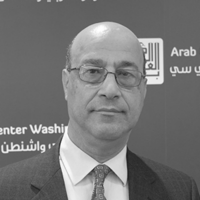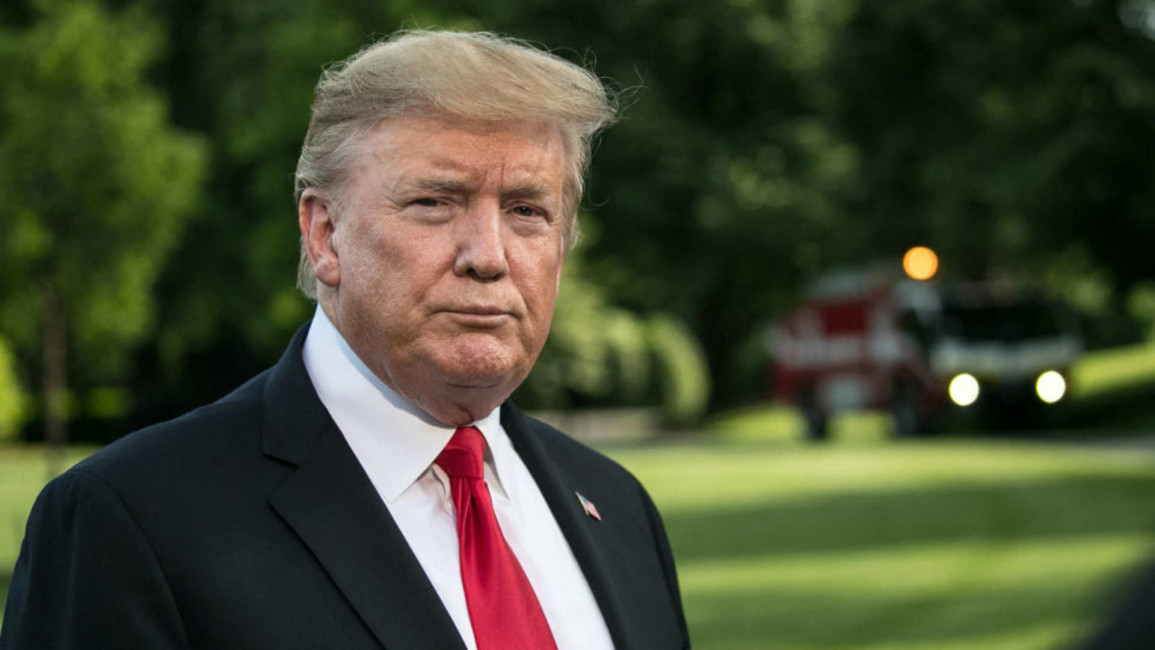
Gulf tanker attacks have a message for Trump, but who is the messenger?
Iran quickly denied responsibility and said it helped rescue crew members. US Secretary of State Mike Pompeo, however, appeared unequivocal about accusing the Islamic Republic of being behind the attacks despite producing no credible evidence to back up his claim.
A closer look at the events of the past few weeks suggest that the new attacks are primarily a message to US president Donald Trump. The way his administration receives this message will likely determine war and peace in the region.
Last May's tensions were precipitated mainly by the sabotage of Saudi and Emirati oil vessels off the coast of the United Arab Emirates, and by Yemeni Houthi attacks on a Saudi pipeline.
This time around, the targets were ships from outside the region, broadening the meaning of the assaults into a more international arena, and necessitating a committed response from the United States as a global power.
 |
It stretches credulity to believe that the Iranian government would just sabotage Mr Abe's mission as he was leaving Tehran |  |
This makes determining the identity of those responsible for the attacks, be they states or non-state actors, of central importance.
Iran as first accused
Iran logically appears uninterested in stoking tensions and the possibility of a confrontation with the United States. After all, it accepted mediators in last May's tensions, including Japanese Prime Minister Shinzo Abe.
Abe's visit to the Iranian capital - the first by a Japanese prime minister since the Islamic Revolution of 1979 - appeared to have succeeded in setting a new tone as he discussed ways to move forward with the Iranian president Hassan Rouhani and Supreme Leader Ali Khamenei.
It stretches credulity to believe that the Iranian government would just sabotage Mr Abe's mission as he was leaving Tehran, considering its positive results and the fact that Japan is a major importer of Iranian oil.
 |
| [Click to enlarge] |
Next to consider is the hardline Islamic Revolutionary Guards Corps that the Trump administration designated as a foreign terrorist organisation last April.
The IRGC has many axes to grind and may very well want to test Mr Trump's mettle. It is known to be reckless when it comes to confronting American ships in the Gulf.
It also has many affiliated militias - in Iraq, Syria and Lebanon - that it can at any convenient time mobilise to challenge the American military or Israel, in order to lift some of the pressure off Iran.
Further, it has been squeezed hard by American sanctions, which affected its clout in the Iranian economy and its base of support in the regime and among the public.
 |
Israeli, Saudi and Emirati leaders had counted on the administration to be the antidote to the former Obama administration |  |
But then again, can the IRGC act on its own without the approval of Supreme Leader Khamenei? While the answer may not be clear, especially considering the wiliness of the aged mullah, it is quite possible that rogue guards may find it opportune to shake things up in Tehran and the region.
Mr Trump's jilted lovers
On the other hand, Saudi Arabia, the UAE, and Israel have been agitating for a confrontation with Iran since before President Trump took office in January 2017. They have been encouraging his rhetoric, actions, and demands for serious changes in Iran's behaviour.
But since the end of May, and despite President Trump's dispatching of naval vessels and troops to the Gulf, there has been a palpable reduction in the rhetoric between Washington and Tehran, making the trio feel like jilted lovers.
President Trump even announced that his administration is not seeking regime change in Iran but wants to ensure that it doesn't develop nuclear weapons.
 |
Israel must have been both surprised and disappointed that its friend in the White House was de-escalating |  |
Secretary Pompeo also declared the administration's readiness to begin negotiations with Tehran without any preconditions.
This had been unimaginable only a couple of weeks earlier, when Pompeo listed 12 demands that Iran was to satisfy, before it can escape sanctions and re-join the international community.
Long apprehensive about Iran, Israel must have been both surprised and disappointed that its friend in the White House was de-escalating from the high note of criticism and attacks directed at Iran.
Saudi Arabia and the UAE too, saw Trump's and Pompeo's retreats on regime change and unconditional negotiations as alarm bells. They most likely concluded that they, with Israel, would be the ones to confront Tehran's mullahs.
Israeli, Saudi and Emirati leaders had counted on the administration to be the antidote to the former Obama administration and to physically contain Iran, even if that required coercive military action.
Twitter Post
|
Since Trump's election, Saudi Arabia and the UAE have tried to buy Mr Trump off by ordering copious amounts of unneeded weapons and ignoring his administration's hapless decisions regarding Palestinian rights.
They, and Israel were quite happy with his choice of Pompeo who sees Iran as evil incarnate, lectures about its perfidy and criminality, and with his appointment of John Bolton as National Security Advisor who long counseled regime change in Tehran.
WATCH: Iran state TV shows video of oil tanker blaze
But Trump's change of heart convinced them that he is unable to commit to any issue for an extended period of time. They also became sure that his ignorance of the details of foreign affairs makes him susceptible to dissuasion.
What Israel, Saudi Arabia, and the UAE also may have mistaken for a Trump firm stand on changing Iran's clerical regime was the cynicism pervading the president's approach to foreign policy.
It is possible, then, that the trio may know something about stirring up the hornets' nest. They may have reasoned that the American president can be reminded of his old positions on Iran, if international vessels are sabotaged.
Still, if responsibility for last May's attacks could not yet be determined to be Iran's, at least this far, how could they now pin it on the Islamic Republic? Besides, would Saudi Arabia and the UAE logically fake a false flag operation that could start a war, when they themselves would be its worst victims?
A more beneficial course of action
Whatever message being sent to the Trump White House, and identifying who is responsible for sending it, are essential for the peace and security of the Gulf region, the Middle East, and the international economy.
It is incumbent upon the Trump administration to be cautious about its next steps. The president's de-escalation last May was a positive development in an otherwise dangerous crisis in the Arabian Gulf.
This time around, and despite the seriousness of the attacks in the Gulf of Oman and some apparent agitation by Mr Pompeo, the administration would do well to continue to de-escalate the tensions in the region.
By de-escalating, the administration can help itself and its allies to step back from the abyss of confrontation with the Islamic Republic of Iran.
Imad K. Harb is the Director of Research and Analysis at Arab Center Washington DC.
Join the conversation: @The_NewArab
Opinions expressed in this article remain those of the author and do not necessarily represent those of The New Arab.




